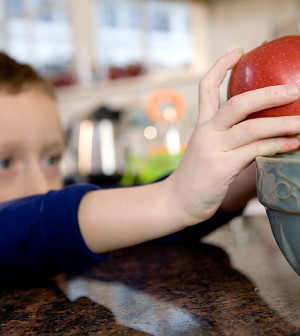- Could Your Grocery Store Meat Be Causing Recurring UTIs?
- Are You Making This Expensive Thermostat Error This Winter?
- Recognizing the Signs of Hypothyroidism
- 10 Strategies to Overcome Insomnia
- Could Artificial Sweeteners Be Aging the Brain Faster?
- Techniques for Soothing Your Nervous System
- Does the Water in Your House Smell Funny? Here’s Why
- Can a Daily Dose of Apple Cider Vinegar Actually Aid Weight Loss?
- 6 Health Beverages That Can Actually Spike Your Blood Sugar
- Treatment Options for Social Anxiety Disorder
Broccoli Compound Shows Promise for Autism Symptoms in Small Study


A compound extracted from broccoli sprouts may improve some social and behavioral problems that affect people with autism, a new study suggests.
The study was short-term and small, including just over 40 teenage boys and young men with autism. And experts stressed that no one is saying broccoli — or its extracts — is a magic bullet.
“This is just one study, and it’s a preliminary study,” said lead researcher Dr. Kanwaljit Singh, of Massachusetts General Hospital for Children.
It’s also important to note that not everyone responded to the treatment. About one-third of those treated with the compound didn’t have a positive response, according to the study.
Still, the findings are “promising” and should be followed up by larger studies that also include women and young children, Singh said.
The compound in question is called sulforaphane, and it’s naturally found in broccoli and other cruciferous vegetables. The chemical has been widely studied for its potential benefits against cancer, according to Singh.
But in the new study, reported on Oct. 13 in the Proceedings of the National Academy of Sciences online, researchers chose to test sulforaphane as an autism therapy.
Why study a broccoli sprout extract? According to Singh, one reason is related to a phenomenon known as the “fever effect,” seen in some children with autism — where problems such as repetitive behavior temporarily fade when the child has a fever.
The researchers theorize that the improvement stems from the fact that fevers trigger a heat-shock response — a cascade of events designed to shield body cells from stress. In lab research, sulforaphane has been found to spark such a heat-shock response, according to the researchers.
To test the compound, Singh’s team recruited 44 boys and young men, aged 13 to 27, with moderate to severe autism. They were randomly assigned to take either sulforaphane capsules or identical-looking placebo capsules every day for 18 weeks.
Based on parents’ reports, many of the boys taking the extract started showing improvements in irritability, repetitive behaviors, hyperactivity and communication by the fourth week, according to the study.
The study staff, who did not know which boys were on the extract or the placebo, noticed similar changes.
Based on their ratings, 46 percent of the sulforaphane group were showing improved social interactions by week 18. Another 42 percent were faring better with verbal communication, and 54 percent were reining in various “aberrant” behaviors, according to the study.
None of those taking the placebo had improvements in social interactions or verbal communications, according to the study. Nine percent of those on the placebo had improvements in aberrant behaviors, the study reported.
Four weeks after the treatment ended, improvements for those taking the sulforaphane were waning, the researchers found.
The study was too small to prove that a broccoli extract can help treat autism, said Dr. Paul Wang, head of medical research for the nonprofit Autism Speaks.
Still, he called the findings “interesting and important.”
“We hope that the authors and other researchers will follow up with larger studies that can address unanswered questions and potential safety issues,” Wang said.
He pointed to one potential safety concern: Two of the young men on sulforaphane had seizures.
Both patients did have a history of seizures, Wang noted, so the extract is not necessarily to blame. But since no placebo users suffered a seizure, it’s still a possible risk that should be studied, according to Wang.
Another researcher agreed that much more work remains. “This shows some promise, but I wouldn’t call it a silver bullet,” said Brandon Korman, a neuropsychologist at Miami Children’s Hospital.
Korman noted that a number of antioxidants, as well as omega-3 fatty acids and other nutritional supplements, have been studied for autism — with mixed results. No single study, he said, can be the final word.
The study had an additional limitation: 80 percent of the young men had a history of the “fever effect.” So, Singh said, it’s not clear whether sulforaphane might benefit only those individuals.
For now, Korman said it probably won’t hurt to give your child broccoli for dinner — if they’re willing to eat it. But the concentration of sulforaphane would be much lower in food, versus the extract, he pointed out.
The extract used in this study is not commercially available, but there are sulforaphane supplements on the market. Singh noted that those supplements are not standardized, and “you wouldn’t know how much sulforaphane it would actually contain.”
Johns Hopkins University, where two of the study authors work, stands to benefit from any future sales of the extract used in the research. Under a licensing agreement with Brassica Protection Products, the university is entitled to royalty received on sales of the product, according to a university news release.
More information
Autism Speaks has more on alternative therapies for autism.
Source: HealthDay
Copyright © 2026 HealthDay. All rights reserved.










